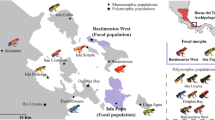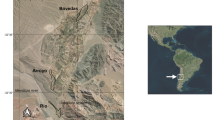Abstract
In the process of inheriting reproduction among social insects, conflicts over reproduction widely exist among potential reproductive individuals. These conflicts are expressed by the suppression of reproductive success or the competition for reproduction. However, such suppression and competition are often accompanied by high cost for individuals. Whether there may or may not be a harmonious behavioral strategy that has evolved to reduce these conflicts has received negligible attention in termites so far. Here, in the lower termite Reticulitermes labralis, we studied specific behaviors of workers before they differentiate into reproductives. Our behavioral observations show that when the queen was present, the workers which successfully replaced reproductives in the future had three different behavioral profiles compared to workers which did not develop into reproductives. That is, in queenright colony, the workers which differentiated into reproductives moved less, performed more proctodeal trophallaxis (anal feeding), and were groomed more than others. These three specific behaviors may indicate which workers have priority during the process of differentiation when queens are absent. We suggest that the weak mobility was intended to save energy, the higher number of proctodeal trophallaxis occurrences could serve as an honest signal to indicate their status, and the higher number of grooming behavior received could be a sign of dominance. Therefore, R. labralis may reduce reproductive conflicts with these specific behaviors which indicate the priority of certain workers to differentiate into replacement reproductives.




Similar content being viewed by others
Data availability
All data generated and analysed during this study are included in the supplementary information.
References
Bang A, Gadagkar R (2012) Reproductive queue without overt conflict in the primitively eusocial wasp Ropalidia marginata. Proc Natl Acad Sci 109(36):14494–14499. https://doi.org/10.1073/pnas.1212698109
Bhadra A, Gadagkar R (2008) We know that the wasps ‘know’: cryptic successors to the queen in Ropalidia marginata. Biol Let 4(6):634–637. https://doi.org/10.1098/rsbl.2008.0455
Cleveland LR (1925) The feeding habit of termite castes and its relation to their intestinal flagellates. Biol Bull 48(5):295–308. https://doi.org/10.2307/1536598
Cuvillier-Hot V, Gadagkar R, Peeters C, Cobb M (2002) Regulation of reproduction in a queenless ant: aggression, pheromones and reduction in conflict. Proc R Soc London B: Biol Sci 269(1497):1295–1300. https://doi.org/10.1098/rspb.2002.1991
Du H, Chouvenc T, Osbrink W, Su N-Y (2016) Social interactions in the central nest of Coptotermes formosanus juvenile colonies. Insectes Soc 63(2):279–290. https://doi.org/10.1007/s00040-016-0464-4
Foster KR, Gulliver J, Ratnieks FLW (2002) Worker policing in the European hornet Vespa crabro. Insectes Soc 49(1):41–44. https://doi.org/10.1007/s00040-002-8277-z
Hamilton C, Lejeune BT, Rosengaus RB (2011) Trophallaxis and prophylaxis: social immunity in the carpenter ant Camponotus pennsylvanicus. Biol Let 7(1):89–92. https://doi.org/10.1098/rsbl.2010.0466
Hart AG, Monnin T (2006) Conflict over the timing of breeder replacement in vertebrate and invertebrate societies. Insectes Soc 53(4):375–389. https://doi.org/10.1007/s00040-005-0895-4
Hayashi Y, Oguchi K, Yamaguchi K, Kitade O, Maekawa K, Miura T, Shigenobu S (2017) Male-specific molecular genetic markers in the Japanese subterranean termite Reticulitermes speratus. Insectes Soc 64(3):357–364. https://doi.org/10.1007/s00040-017-0553-z
Heinze J, Hölldobler B, Peeters C (1994) Conflict and cooperation in ant societies. Naturwissenschaften 81(11):489–497. https://doi.org/10.1007/BF01132680
Heinze J, Oberstadt B (1999) Worker age, size and social status in queenless colonies of the ant Leptothorax gredleri. Anim Behav 58(4):751–759. https://doi.org/10.1006/anbe.1999.1188
Hoffmann K, Korb J (2011) Is there conflict over direct reproduction in lower termite colonies? Anim Behav 81(1):265–274. https://doi.org/10.1016/j.anbehav.2010.10.017
Holman L, Jørgensen CG, Nielsen J, d’Ettorre P (2010) Identification of an ant queen pheromone regulating worker sterility. Proc R Soc B: Biol Sci 277(1701):3793–3800. https://doi.org/10.1098/rspb.2010.0984
Hoover SE, Keeling CI, Winston ML, Slessor KN (2003) The effect of queen pheromones on worker honey bee ovary development. Naturwissenschaften 90(10):477–480. https://doi.org/10.1007/s00114-003-0462-z
Howard RW, Blomquist GJ (2005) Ecological, behavioral, and biochemical aspects of insect hydrocarbons. Annu Rev Entomol 50:371–393. https://doi.org/10.1146/annurev.ento.50.071803.130359
Huang QY, Wang WP, Mo RY, Lei CL (2008) Studies on feeding and trophallaxis in the subterranean termite Odontotermes formosanus using rubidium chloride. Entomol Exp Appl 129(2):210–215. https://doi.org/10.1111/j.1570-7458.2008.00764.x
Jandt JM, Dornhaus A (2011) Competition and cooperation: bumblebee spatial organization and division of labor may affect worker reproduction late in life. Behav Ecol Sociobiol 65(12):2341–2349. https://doi.org/10.1007/s00265-011-1244-9
Jia W, Su X, Kong X, Liu M, Xing L (2013) Multiple male and female reproductive strategies and the presence of a polyandric mating system in the termite Reticulitermes labralis (Isoptera:Rhinotermitidae). Sociobiology 60(4):459–465
Konrad M, Pull CD, Metzler S, Seif K, Naderlinger E, Grasse AV, Cremer S (2018) Ants avoid superinfections by performing risk-adjusted sanitary care. Proc Natl Acad Sci 115(11):2782–2787. https://doi.org/10.1073/pnas.1713501115
Korb J (2005) Regulation of sexual development in the basal termite Cryptotermes secundus: mutilation, pheromonal manipulation or honest signal? Naturwissenschaften 92(1):45–49. https://doi.org/10.1007/s00114-004-0589-6
Korb J, Hartfelder K (2008) Life history and development-a framework for understanding developmental plasticity in lower termites. Biol Rev 83(3):295–313. https://doi.org/10.1111/j.1469-185X.2008.00044.x
Korb J, Schmidinger S (2004) Help or disperse? Cooperation in termites influenced by food conditions. Behav Ecol Sociobiol 56(1):89–95. https://doi.org/10.1007/s00265-004-0757-x
Korb J, Weil T, Hoffmann K, Foster KR, Rehli M (2009) A gene necessary for reproductive suppression in termites. Science 324(5928):758–758. https://doi.org/10.1126/science.1170660
Liu L, Wang W, Liu Y, Sun P, Lei C, Huang Q (2019) The influence of allogrooming behavior on individual innate immunity in the subterranean termite Reticulitermes chinensis (Isoptera: Rhinotermitidae). J Insect Sci 19(1):6. https://doi.org/10.1093/jisesa/iey119
Matsuura K, Himuro C, Yokoi T, Yamamoto Y, Vargo EL, Keller L (2010) Identification of a pheromone regulating caste differentiation in termites. Proc Natl Acad Sci 107(29):12963–12968. https://doi.org/10.1073/pnas.1004675107
Matsuura K, Mizumoto N, Kobayashi K, Nozaki T, Fujita T, Yashiro T, Vargo EL (2018) A genomic imprinting model of termite caste determination: not genetic but epigenetic inheritance influences offspring caste fate. Am Nat 191(6):677–690. https://doi.org/10.1086/697238
McMahan EA (1969) Feeding relationships and radioisotope techniques. In: Krishna K, Weesner FM (eds) Biology of termites. Academic Press, New York, pp 387–406
Miller ME (1969) Caste differentiation in lower termites. In: Krishna K, Weesner FM (eds) Biology of termites. Academic Press, New York, pp 283–310
Mirabito D, Rosengaus R (2016) A double-edged sword? The cost of proctodeal trophallaxis in termites. Insectes Soc 63(1):135–141. https://doi.org/10.1007/s00040-015-0448-9
Miyata H, Furuichi H, Kitade O (2004) Patterns of neotenic differentiation in a subterranean termite, Reticulitermes speratus (Isoptera: Rhinotermitidae). Entomol Sci 7(4):309–314. https://doi.org/10.1111/j.1479-8298.2004.00078.x
Monnin T (2006) Chemical recognition of reproductive status in social insects. Ann Zool Fenn 43:515–530
Monnin T, Peeters C (1999) Dominance hierarchy and reproductive conflicts among subordinates in a monogynous queenless ant. Behav Ecol 10(3):323–332. https://doi.org/10.1093/beheco/10.3.323
Nalepa CA (2015) Origin of termite eusociality: trophallaxis integrates the social, nutritional, and microbial environments. Ecol Entomol 40(4):323–335. https://doi.org/10.1111/een.12197
Nunes TM, Mateus S, Favaris AP, Amaral MF, Von Zuben LG, Clososki GC, Zucchi R (2014) Queen signals in a stingless bee: suppression of worker ovary activation and spatial distribution of active compounds. Sci Rep 4(1):1–7. https://doi.org/10.1038/srep07449
O’Donnell S (1996) Reproductive potential and division of labor in wasps: are queen and worker behavior alternative strategies? Monitore Zoologico 8(3):305–308. https://doi.org/10.1080/08927014.1996.9522921
Parmentier D, Roisin Y (2003) Caste morphology and development in Termitogeton nr. planus (Insecta, Isoptera, Rhinotermitidae). J Morphology 255(1):69–79. https://doi.org/10.1002/jmor.10047
Peeters C (1991) The occurrence of sexual reproduction among ant workers. Biol J Lin Soc 44(2):141–152
Peeters C, Billen J (1991) A novel exocrine gland inside the thoracic appendages (‘gemmae’) of the queenless ant Diacamma australe. Experientia 47(3):229–231. https://doi.org/10.1007/BF01958143
Peeters C, Crewe R (1984) Insemination controls the reproductive division of labor in a ponerine ant. Naturwissenschaften 71(1):50–51. https://doi.org/10.1007/Bf00365989
Provecho Y, Josens R (2009) Olfactory memory established during trophallaxis affects food search behaviour in ants. J Exp Biol 212(20):3221–3227. https://doi.org/10.1242/jeb.033506
Ratnieks FLW, Foster KR, Wenseleers T (2006) Conflict resolution in insect societies. Annu Rev Entomol 51(1):581–608. https://doi.org/10.1146/annurev.ento.51.110104.151003
Roisin Y, Korb J (2011) Social organisation and the status of workers in termites. In: Bignell DE, Roisin Y, Lo N (eds) Biology of termite: a modern synthesis. Springer Verlag, Heidelberg, pp 133–164
Shimada K, Lo N, Kitade O, Wakui A, Maekawa K (2013) Cellulolytic protist numbers rise and fall dramatically in termite queens and kings during colony foundation. Eukaryot Cell 12(4):545–550. https://doi.org/10.1128/EC.00286-12
Sommer K, Hölldobler B, Rembold H (1993) Behavioral and physiological aspects of reproductive control in a Diacamma species from Malaysia (Formicidae, Ponerinae). Ethology 94(2):162–170. https://doi.org/10.1111/j.1439-0310.1993.tb00556.x
Strassmann JE, Fortunato A, Cervo R, Turillazzi S, Damon JM, Queller DC (2004) The cost of queen loss in the social wasp Polistes dominulus (Hymenoptera: Vespidae). J Kansas Entomol Soc 77(4):343–355. https://doi.org/10.2317/E-15.1
Su X, Yang X, Li J, Xing L, Liu H, Chen J (2017) The transition path from female workers to neotenic reproductives in the termite Reticulitermes labralis. Evol Dev 19(4–5):218–226. https://doi.org/10.1111/ede.12229
Sun Q, Hampton JD, Merchant A, Haynes KF, Zhou X (2020) Cooperative policing behaviour regulates reproductive division of labour in a termite. Proc R Soc B 287(1928):20200780. https://doi.org/10.1098/rspb.2020.0780
Sun Q, Haynes KF, Hampton JD, Zhou X (2017) Sex-specific inhibition and stimulation of worker-reproductive transition in a termite. Sci Nat 104(9–10):79. https://doi.org/10.1007/s00114-017-1501-5
Tsuji K, Egashira K, Hölldobler B (1999) Regulation of worker reproduction by direct physical contact in the ant Diacamma sp. from Japan. Anim Behav 58(2):337–343
Uva P, Clément J-L, Austin JW, Aubert J, Zaffagnini V, Quintana A, Bagnères A-G (2004) Origin of a new Reticulitermes termite (Isoptera, Rhinotermitidae) inferred from mitochondrial and nuclear DNA data. Mol Phylogenet Evol 30(2):344–353. https://doi.org/10.1016/S1055-7903(03)00202-1
Van Oystaeyen A, Oliveira RC, Holman L, van Zweden JS, Romero C, Oi CA, Wäckers F (2014) Conserved class of queen pheromones stops social insect workers from reproducing. Science 343(6168):287–290. https://doi.org/10.1126/science.1244899
Visscher PK, Dukas R (1995) Honey bees recognize development of nestmates’ ovaries. Anim Behav. https://doi.org/10.1006/anbe.1995.0074
Wenseleers T, Ratnieks FL (2006) Enforced altruism in insect societies. Nature 444(7115):50–50. https://doi.org/10.1038/444050a
Wilson EO (1971) The insect societies. Harvard University Press, Cambridge, Massachusetts
Wilson EO (1975) Sociobiology. Harvard University Press, Cambridge
Wu J, Su X, Kong X, Liu M, Xing L (2013) Multiple male and female reproductive strategies and the presence of a polyandric mating system in the termite Reticulitermes labralis (Isoptera: Rhinotermitidae). Sociobiology 60(4):459–465
Yanagawa A, Shimizu S (2007) Resistance of the termite, Coptotermes formosanus Shiraki to Metarhizium anisopliae due to grooming. Biocontrol 52(1):75–85. https://doi.org/10.1007/s10526-006-9020-x
Acknowledgements
This work was supported by the Project for Graduate Innovation Team of Northwestern Polytechnical University (02020-19GH010208) and the National Natural Science Foundation of China (31360104).
Author information
Authors and Affiliations
Contributions
RW and ZB conceived the ideas and designed methodology, ZB, and YL performed experiments and collected data, ZB analysed data, and RW, ZB, and DSD wrote the manuscript.
Corresponding author
Ethics declarations
Conflict of interest
The authors declare that they have no conflict of interest.
Ethical approval
All termite colonies were subject to review by the local ethical review committee of the School of Ecology and Environment, Northwestern Polytechnical University, Xi’an, China. The experiments were conducted in accordance with international standards on animal welfare.
Supplementary Information
Below is the link to the electronic supplementary material.
Ten-seconds recording (as an example) for two experimental groups comprising 48 workers which marked with color code, one soldier, and one replacement queen s and kept each into 6-cm Petri dishes (whose bottom was covered with moist filter paper) (WMV 10202 KB)
Rights and permissions
About this article
Cite this article
Bai, Z., Liu, Y., Sillam-Dussès, D. et al. Behavioral differentiation among workers may reduce reproductive conflicts during colony inheritance in the termite Reticulitermes labralis. Insect. Soc. 69, 229–236 (2022). https://doi.org/10.1007/s00040-022-00862-8
Received:
Revised:
Accepted:
Published:
Issue Date:
DOI: https://doi.org/10.1007/s00040-022-00862-8




